Key takeaways:
- Ethical consumer education emphasizes the impact of purchasing decisions on people, animals, and the planet, promoting informed choices and sustainability.
- Engaging with ethical marketplaces fosters a sense of connection, community, and supports brands that prioritize sustainability and responsible practices.
- Key principles of ethical consumerism include informed choice, transparency, and fairness, highlighting the importance of understanding product origins and supporting equitable practices.
- Practical steps for ethical shopping involve researching brands, prioritizing local products, and mindful consumption to align purchases with personal values and community support.
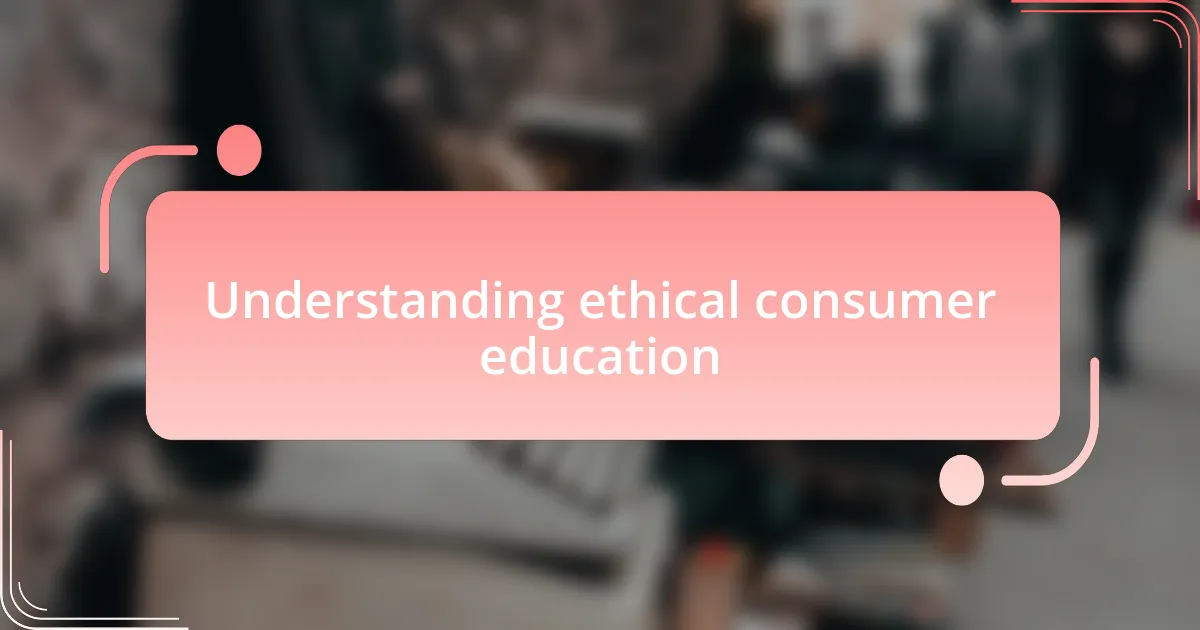
Understanding ethical consumer education
Ethical consumer education revolves around understanding the impact of our purchasing decisions on people, animals, and the planet. I remember the first time I truly grasped the concept; it struck me that my choices at the grocery store could influence the welfare of farmers overseas. Isn’t it empowering to think that every product we buy has a story behind it, one that affects lives far beyond our neighborhood?
One of the most enlightening aspects of ethical consumer education is realizing that it’s not just about being a responsible shopper; it’s about engaging with brands that align with our values. I often find myself questioning whether my favorite brands genuinely support sustainable practices or are simply using greenwashing as a marketing tactic. How do we really know when a company is committed to ethical practices? This ongoing dialogue encourages us to dig deeper into the ethics of our consumption.
Exploring ethical consumer education also means understanding the broader implications of our choices. For instance, I’ve learned that supporting fair trade not only helps artisans in developing countries but also aids in cultivating community and self-sufficiency. When we make mindful decisions, we’re not just consumers; we’re advocates for change, influencing a market that can be transformed by conscious collective action.
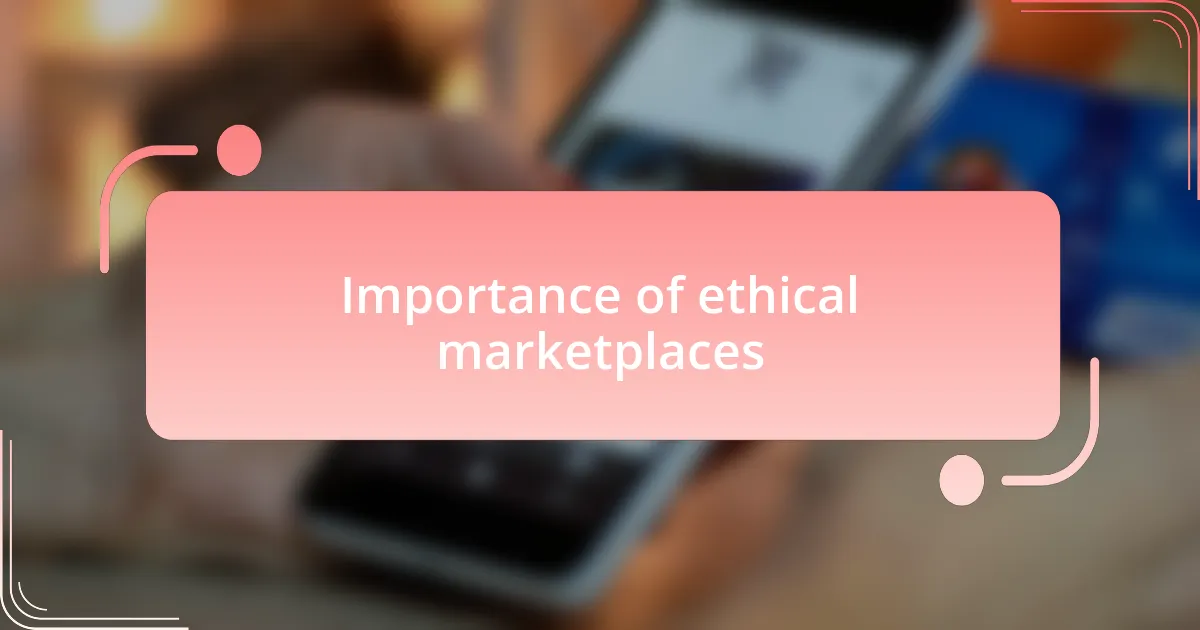
Importance of ethical marketplaces
Ethical marketplaces play a critical role in redefining consumer behavior. I often remind myself that when I choose to support businesses prioritizing sustainability, I’m sending a clear message about what matters to me. Can you imagine the power of our collective purchasing decisions? They can drive significant change, encouraging brands to adopt more transparent and responsible practices.
In my experience, shopping in ethical marketplaces has given me a sense of connection to the products I buy. Once, I purchased handmade crafts from a local fair-trade event, and each piece came with a story that made the purchase feel personal. It made me realize that supporting ethically produced goods not only impacts the makers positively but also enriches my sense of community and belonging.
These marketplaces also educate us about the origins of our products, fostering a deeper understanding of the value of conscious consumption. I find it fascinating how a simple choice can ripple out, affecting economies and societies. When we engage with ethical marketplaces, aren’t we essentially participating in a global conversation about sustainability and equality? This awareness keeps the dialogue alive and pushes all of us toward a more conscientious way of living.
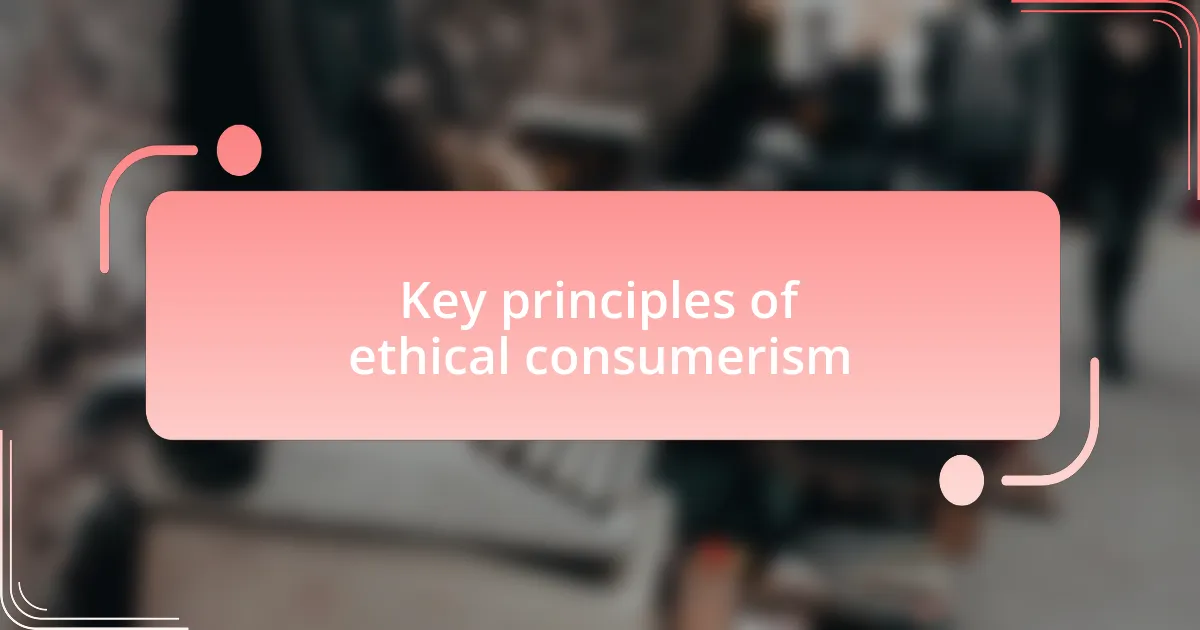
Key principles of ethical consumerism
One key principle of ethical consumerism is the practice of informed choice. When I make a purchase, I always consider the environmental, social, and economic impact of my decision. Have you ever looked at a product’s label and thought about the journey it took to get to you? I remember a time when I chose to buy organic produce after researching the benefits of supporting local farmers. It felt empowering to know that my choices were helping to sustain the environment and support my community.
Another essential aspect is transparency. I often seek out brands that openly share their sourcing practices and production methods. It’s like having a window into the brand’s ethics and values. Last month, I attended an artisan market where each vendor explained their sustainable practices. This interactive experience deepened my appreciation for what goes into each product, reinforcing my commitment to purchasing ethically.
Lastly, embracing fairness is paramount in ethical consumerism. I strive to support businesses that prioritize fair labor practices and equitable pay. Once, I bought a beautifully crafted bag from a socially responsible organization that supports artisans in developing countries. Knowing that my purchase directly contributed to improving someone’s livelihood made the transaction feel more meaningful and fulfilling. Isn’t it remarkable how each choice we make can echo in the lives of others?
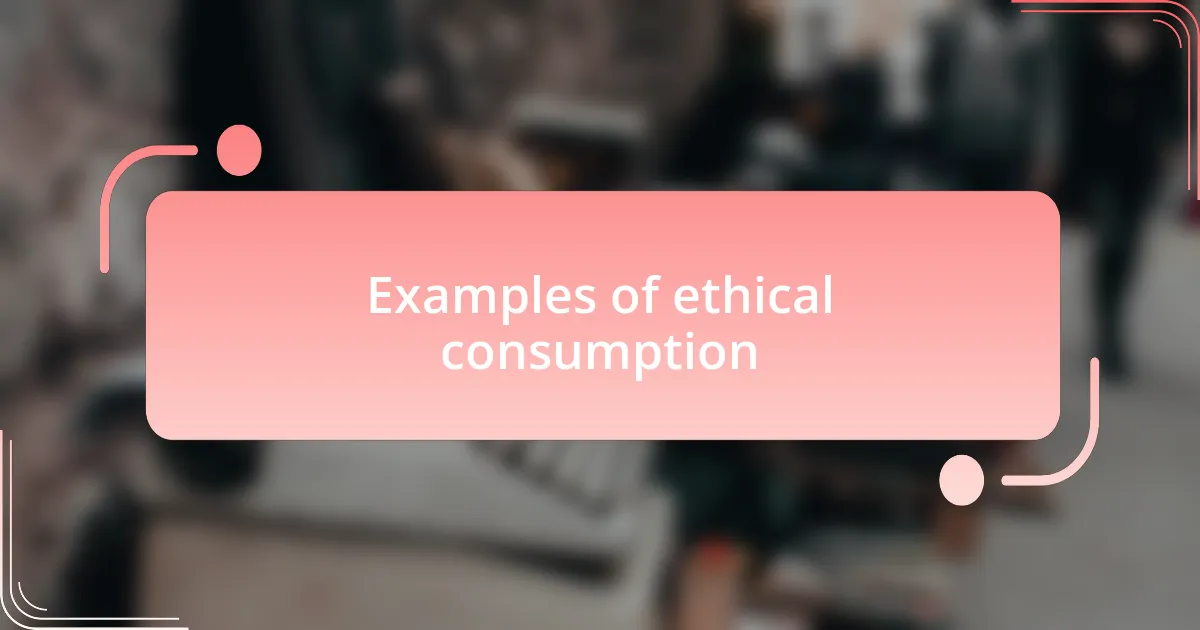
Examples of ethical consumption
When I think about ethical consumption, I’m always drawn to the impact of buying second-hand. A few months ago, I stumbled upon a local thrift store that supports job training for at-risk youth. As I browsed through the racks of clothing, each piece held a story. Isn’t it incredible to consider how a simple purchase could transform lives and give young people a chance at a brighter future?
I also find that choosing cruelty-free products makes a significant difference. I once discovered a skincare brand that not only avoids animal testing but also actively donates a portion of profits to animal rescue organizations. Knowing that my love for skincare could go hand-in-hand with supporting a cause I care about filled me with joy. How often do we get to use our buying power to stand up for those who cannot speak for themselves?
Fair trade items are another shining example of ethical consumption. I remember visiting a fair trade coffee shop where I learned that each cup not only supports sustainable farming but also provides fair wages for farmers. As I sipped my latte, I felt an extraordinary connection to the people behind my beverage, appreciating how my choice positively affected their lives. Don’t you think it’s beautiful to know that our everyday habits can be a force for good?
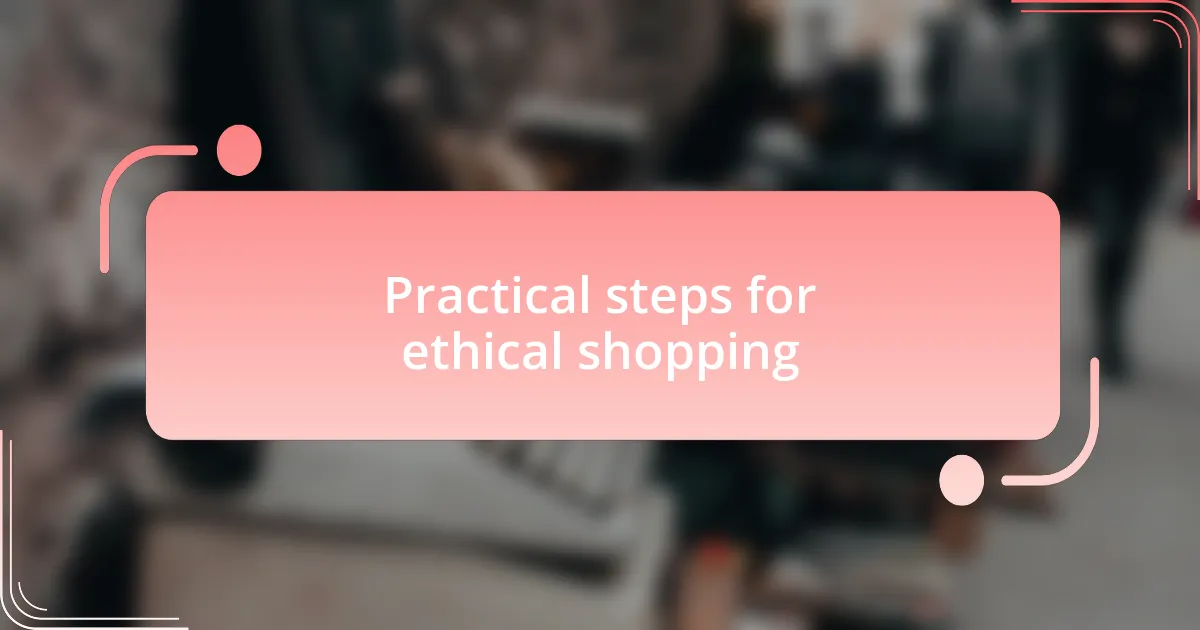
Practical steps for ethical shopping
When I shop, I gravitate towards brands that are transparent about their practices. Recently, I made a point to research a clothing company before making a purchase, and I was pleased to find that they provided detailed information about their supply chain. Seeing how they sourced their materials ethically gave me confidence that my money was supporting fair labor practices. Isn’t it empowering to know exactly where your purchases are coming from?
Another step I find incredibly impactful is prioritizing local products whenever possible. Last summer, I visited a farmer’s market and was thrilled to see an array of organic produce from nearby farms. Not only did I enjoy the fresh flavors, but purchasing locally cut down on carbon emissions from transportation and supported the community directly. How often do we think about the broader impact of our shopping choices?
I also advocate for mindful consumption by setting a personal rule: before I buy something new, I ask myself if I truly need it. A few months ago, I faced a tempting sale online for a trendy item, but I paused to consider its necessity. In the end, I opted to save my money for something more essential and ethical later. Doesn’t it feel fulfilling to make choices that align with our values rather than impulsively?
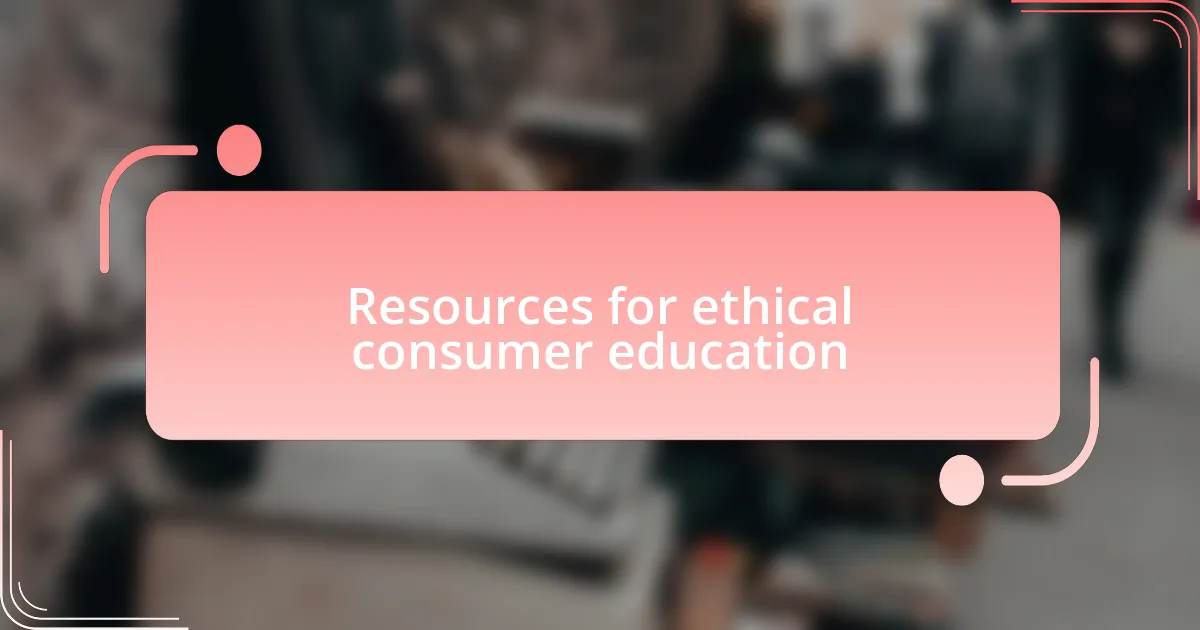
Resources for ethical consumer education
When it comes to ethical consumer education, I often turn to various online platforms and resources that break down complex topics into digestible information. For instance, I enjoy following blogs dedicated to ethical fashion, where writers share brand ratings based on their labor practices and environmental impacts. Finding honest reviews feels like having a trusted friend guide me through the overwhelming world of consumer choices. Don’t you also appreciate when someone simplifies intricate topics for you?
Moreover, I can’t stress enough the value of documentaries and podcasts that delve into consumerism’s ethical implications. I was profoundly moved by a documentary that highlighted the stories of workers in developing countries and the sacrifices they make for our benefits as consumers. It struck a chord within me, reinforcing the importance of informed purchasing. Don’t you think that understanding the human stories behind the products we buy makes our choices more meaningful?
Lastly, I find community events to be an enriching resource for ethical consumer education. Attending a workshop on sustainable living last year opened my eyes to practices I had never considered, such as upcycling and zero-waste living. Engaging with like-minded individuals creates a sense of camaraderie, and I always leave feeling inspired and motivated to implement what I’ve learned. Isn’t it refreshing to be part of a community that values change together?